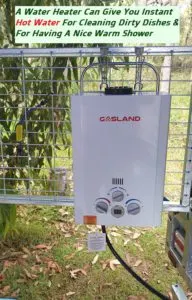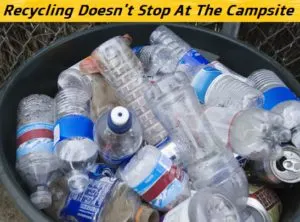 Maintaining clean eating while camping can be a bit of a challenge even for the most experienced camper. With all the outdoor dirt, dusty conditions, and muddy grounds, camping can get quite messy and dirty. Even experienced campers are not immune to the unhygienic conditions thrown at them, but the key difference is that they are far better prepared.
Maintaining clean eating while camping can be a bit of a challenge even for the most experienced camper. With all the outdoor dirt, dusty conditions, and muddy grounds, camping can get quite messy and dirty. Even experienced campers are not immune to the unhygienic conditions thrown at them, but the key difference is that they are far better prepared.
Furthermore, such environments make enjoying a meal much more complicated and hazardous, especially when camping for an extended duration. There hasn’t been a single camping trip where I haven’t ended up with a sandy sausage which is in my opinion, safe to eat.
But when it comes to the times where you are questioning the food before you even cook it, this is when you can really get into trouble. It really is not worth getting food poisoning while you are not close by to clean amenities or a doctor. In fact, it’s never worth risking food poisoning. If in doubt, throw it out. That is my #1 tip.
Therefore, to make sure you don’t fall sick, it’s imperative that you are well prepared before you even get in the car to head out to the campsite. To help with some basic cleanliness preparations, I have listed a few of the more important and insightful tips on how to maintain a clean cooking environment throughout your camping trip.
Camping Antibacterial Wipes Are A Must Have!
1. Antibacterial Wipes/Cleaning for Ensuring Surfaces are Clean
Camping Antibacterial wipes are essential accessories to bring with you on solo adventures or group camping trips. In essence, they are pre-moistened sheets which contain disinfectant. If you plan to keep your camping cooking site well-kempt and clean, wiping your surfaces with antibacterial wipes not only eradicates germs and dirt, it also keeps your surfaces clean for future cooking use.
More so, antibacterial wipes are great additions for camping trips simply because
- They alleviate the use of towels and papers, which can easily cause clutter around your cooking site.
- It can be disposed of quickly as they are small and can be scrunched up and thrown away.
- Many varieties of antibacterial wipes are now eco-friendly and biodegradable. This means they pose no harm to the environment.
- Using towels to clean your cooking surfaces can easily spread germs, which can lead to salmonella poisoning, stomach aches, and diarrhea.
- They are easy to use, wipe, and you’re done.
- They come in small packets with many sheets, making them easy to store and carry around.
- Wipes can drastically reduce the costs of buying fabric and paper towels. More so, it reduces costs and saves you money.
2. Clean The Camp Dishes With Hot Water 
It can be tedious cleaning off oil stains from plates, especially after eating a delicious plate of lasagna by the campfire. Having access to hot water can easily make cleaning dishes effortless.
Sure, finding access to hot water may not be as direct as finding a faucet. So many people are easily tempted to use room temperature water to wash their dishes. However, this is not the most hygienic approach. In this day and age, with the right camping equipment, you can have access to instant hot water.
If investing in new equipment is out of the question then you can consider boiling water from any sources around streams or lakes for roughly 15 minutes or so to kill the germs for kitchen use. But don’t drink this water, just use it to clean your campsite and the dirty dishes.
Tips For A Cleaner Campsite Using Hot Water
Having hot water with your cooking and cleaning camping sessions can provide a myriad of advantages, such as
Cuts off Oil and Grease
Hot water easily cuts through rough grease and oil leftovers on dishes. Before your washing, soak a couple of plates in hot water to remove the fat so that washing can be more manageable.
Eradicates Germs and Bacteria
Upholding a good standard of hygiene when camping is vital to your health. Hot water can kill germs that tend to thrive under cold or mild temperatures. Before dishing out food to your camp buddies, rinse plates with some hot water beforehand to clean off any lingering microorganisms.
Significantly Reduces Drying Time
Hot water used to rinse plates easily evaporates in a matter of seconds. This can cut down on serving time and minimizes the use of bacteria carrying towels and cloths.
Tips:
- Neatly organize and arrange dishes instead of piling them up. This can reduce clutter and prevent food from spilling.
- Don’t let food on plates dry up as this can easily attract unwanted animals to your campsite.
- Soak plates in hot water to remove food scents to prevent ant infestations.
3. Bring A Bin with a Lid for Rubbish
Many first time campers will forget to bring a rubbish bin for their food and drink scraps, but it is one of the most essential items for keeping your campsite kitchen clean. When you’re camping in wildlife territory, any food scents and spillages are bound to arouse the attention of animals near you.
When disposing of food and waste, use covered bins. This helps to keep critters, such as raccoons, and insects away from your trash and contain any funky, smelly odors. Besides, the use of a closed bin helps to keep your campsite clean by storing your garbage in an enclosed containment, which reduces visual pollution and litter while making your site look neat and clean.
Advisably, you should aim to keep your bin far away from your area of cooking. Aside from hygienic purposes and minimizing bacteria, it prevents campers from associating the cooking area with trash and litter.
4. Watertight Storage Containers to Store Food In
An item every campsite should have in their repertoire is a nice sturdy storage container for their food. The best Tupperware containers for camping will make a huge difference to the overall cleanliness of eating while camping.
Besides the fact that there are no refrigerators in the wild, a storage container is ideal for preparing your food at home before heading out for your trip and for storing any leftovers from the camp cookout. Thrown out leftovers can easily attract the attention of bears and other predators. More so, they protect your food from late-night kitchen raids and insect infestations.
During seasons of heavy showers, these watertight containers can prevent water from seeping into your food. When food contacts moisture, it leads to the breeding of moss and algae. Contaminated food can easily lead to severe food poisoning. These containers can double up as a storage medium to transfer water or as a pastry box to safely keep your bread away.
A good quality waterproof Tupperware container will also be your best friend for storing food in your Esky or camping fridge. If the idea of eating a soggy sandwich turns you off, then I highly recommend you spend up on decent containers.
If you are storing your food in a cooler with ice, check out these tips on ways to reduce water spoiling your food.
5. Prep Food at Home Before Going Camping
To prevent cooking area clusters, consider cooking your meals well in advance. By preparing your meals at home, you alleviate the need to dirty the area with peels, pieces of vegetables, and other debris. This can drastically reduce the time it takes to prepare food and removes the need for unnecessary waste, which makes keeping your area cleaner much more sustainable.
In the outdoors, securing steady supplies and resources is not as easy. At home, you have more access to spices and other flavorings in which you can spice up your food. Also, with ample gas and electricity, you can warm up and cook food to your liking without getting soot and carbon from campfires.
If you prepare your food at home, you also eliminate the need to be slicing tomatoes and cutting up onions in a dirty sandy environment, keeping your tastebuds happy and your cooking area cleaner.
Setup The Camp Kitchen To Remain Clean
The disadvantage of cooking outdoors is that you’re susceptible to weather conditions. Knowing how to cook when its raining goes hand in hand with camp cleanliness. If it rains and the floor gets muddy, you’re bound to drag along mud even into your campsite cooking area. This can be quite unhygienic and annoying to say the least.
The amount of dirt piled up can lead to an immense build-up of germs and bacteria. By setting your kitchen over a camping flooring system, you minimize the amount of trash carried into your kitchen area. Furthermore, it makes it easier to catch and sweep breadcrumbs and other debris that may otherwise attract ants and insects.
In Summary
When trying to maintain clean eating while camping, keep the necessary sanitary procedures in check. Bins, proper hand sanitization, and adequate Tupperware can prevent the transfer of germs and keep you healthy throughout your camping endeavor.
However, don’t expect to have the same cooking experience as your home kitchen. Camping can be messy no matter how hard you try to keep the camping kitchen clean. A strong gust of wind can undo all your hard work in a matter of seconds.
So try to position your kitchen in a sheltered area with as many windbreaks as possible. Gazebo tents or gazebos with walls are a great way to reduce the impact of wind blowing dust and grass all over your kitchen. This will help to ensure your hard work of keeping the table and cutlery dust-free remains intact.
